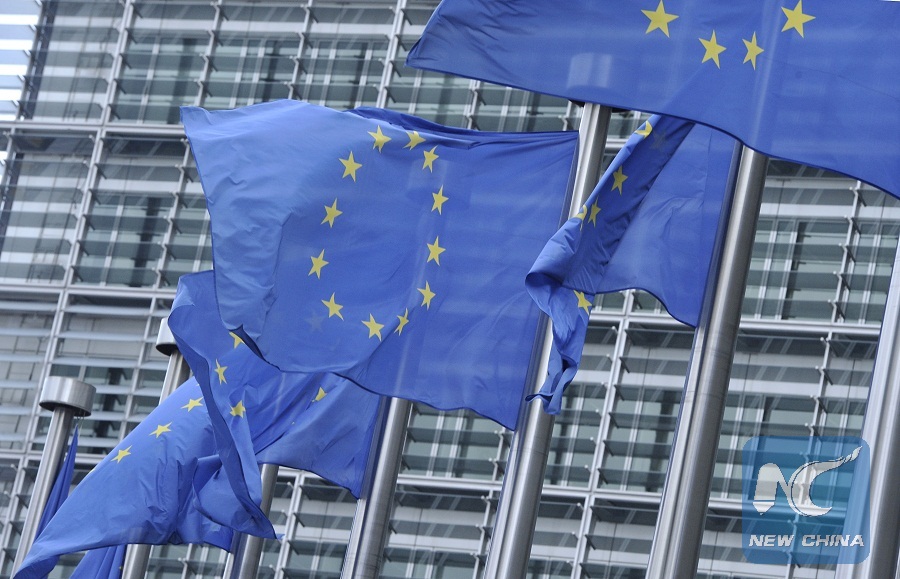
The European Union flags flutter in front of EU headquarters in Brussels, Belgium, on Oct. 12, 2012. (Xinhua/Wu Wei)
BRUSSELS, July 12 (Xinhua) -- As the appeal for open markets made at the Hamburg G20 Summit still resounds, the troika of the European Union (EU) -- the European Commission, the European Parliament and the European Council -- gather here Tuesday for a long-anticipated talk, focusing unexpectedly not on expanding openness but enhancing protection inside the EU's fences.
The tripartite meeting marks a fresh and major step of the EU to legalize its new anti-dumping rules. Should the troika agree on the rules after rounds of negotiation, the EU is just a step away from a new anti-dumping wall.
The calculated and sophisticated "Maginot Line" takes "market distortion" as its core shield, a concept that is stated neither in the anti-dumping nor the anti-subsidy rules of the World Trade Organization (WTO).
By legalizing this concept, the EU is playing paronomasia with the world, especially with China, using "market distortion" to conceal its "surrogate country" approach.
That is to say, even if the surrogate country approach is dropped, the EU will leave open the option to use "international" prices and cost reference in further anti-dumping cases if "market distortion" is found, which is simply adding old wine in a new bottle.
In accordance with Article 15 of the accession protocol signed when China joined the WTO in 2001, the surrogate country approach expired on Dec. 11, 2016.
However, addicted to waving the "surrogate country" stick in anti-dumping cases against China, the EU is reluctant, if not rejective, to disarm itself. But neither dislike nor rejection defends Europe's reputation as the headstream of free trade. So the "market distortion" scheme enables it to kill three birds with one stone -- safeguard its reputation, fulfill obligations endowed by Article 15 while keeping its trump card.
The scheme brings harm in three ways.
For starters, if approved, the new anti-dumping wall will stain EU's fame as a reliable partner. "Market distortion" is in essence the "surrogate country approach" in disguise. If carried out, the EU will fail to fulfill its duty stipulated by Article 15.
Secondly, if passed, the new anti-dumping rules will trigger new trade rows between the EU and China and undermine their win-win trade and cooperation.
Last but not the least, if ratified, the "Maginot Line" may encourage protectionism in other parts of the world, putting the fragile recovery of the global economy in danger.
In fact, China's effort to cut overcapacities at home, especially in the steel industry, has been underestimated.
China plans to reduce steel capacity by 100 million to 150 million tons in 2016-2020. In 2016, more than 65 million tons of steel production capacity was phased out, beating the annual target. As of the end of May, 42.39 million tons of capacity had been slashed, accounting for 84.8 percent of the annual goal.
It is highly advisable that the EU, a main pillar of international free trade, view the overcapacity issue rationally and objectively, and distances itself from protectionism, as protectionism offers no real protection.

